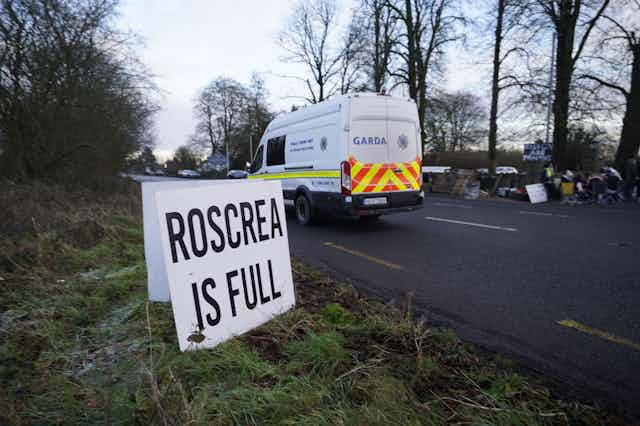The issue of asylum in Ireland has become increasingly contentious and fraught over the past year. Taoiseach Leo Varadkar has said arrests will be made after a spate of arson attacks against properties linked to housing asylum seekers.
Protests have been held outside hotels and shelters across the country. And, notoriously, the riots that took place in Dublin in November 2023 were sparked by claims spread on social media that several violent stabbings in the city centre were carried out by an immigrant – who turned out to be a naturalised citizen.
A perfect storm has unfolded in Ireland in recent years. The number of asylum seekers has increased sharply (to over 13,000 per year in the past two years) and many Ukrainians have sought temporary protection (about 100,000 since the war began). All the while, Ireland has been experiencing a housing crisis. Record numbers of Irish people are in emergency accommodation and there has been a surge in rough sleeping.
This creates the impression that asylum seekers may somehow be responsible for the housing crisis or competing with Irish people for scarce resources. That’s certainly an impression that has been cleverly seized on by the far right, which has been spreading damaging tropes and seeking to capitalise on protests by local communities against the opening of new asylum reception centres. This is therefore a good moment to dispel some of the leading myths.
‘The inn is full’
When a County Galway hotel that was due to accommodate asylum seekers was set on fire in December, a local Fianna Fáil councillor said that “the inn is full”. The councillor has been reported to his party over the comments but not before he’d already given the impression that Ireland is inundated with asylum seekers.

There has been a marked increase in the number of people claiming asylum in Ireland over the past two years, placing Ireland for the first time in the top half of EU member states as an asylum destination. However, Ireland received just 1.4% of the almost 1 million people applying for asylum in EU countries in 2022. By contrast, Germany, France, Spain, Austria and Italy received, between them, almost 75% of asylum applications. When further compared with impoverished asylum-hosting countries, any suggestion that Ireland is overburdened does not hold up.
‘Asylum seekers are causing the housing crisis’
Given the accommodation crisis in Ireland, it is understandable that some people think asylum seekers are competing with Irish citizens for scarce resources. However, the two problems – the accommodation crisis facing Irish people and the accommodation crisis facing asylum seekers – are distinct from one another, even if they overlap.
The former problem is linked to successive government policies relating to homelessness, housing delivery, planning laws, house and rent prices and support for buyers and renters. The latter problem is a product of direct provision.
Direct provision is the Irish system of asylum accommodation that has existed since 2000, whereby private contractors profit enormously from providing bed and board to asylum seekers.
The accommodation is often overcrowded, the environment unsafe for children, the food unnourishing and the general conditions a risk to mental health. Direct provision has been the subject of numerous critical domestic and international reports, not one but two major government reviews and a government white paper.

The weekly allowance paid to asylum seekers places them below the poverty line (€38.80 per week per adult, €29.80 per child). Since the government relies on the private market for supply, it cannot guarantee that enough people will be able to get direct provision places. As a result, asylum seekers are also placed in emergency accommodation or, increasingly, have to sleep rough (more than 600 asylum seekers are currently on the streets).
And yet nothing has been done to dismantle direct provision and replace it with something else. Indeed, only since the issue has gained prominence in recent weeks have tangible alternatives been advanced by government ministers.
The idea of a number (perhaps six) state-owned reception centres has been mooted. While this would be an improvement on private service providers, questions remain about how a public system would work, particularly in light of Ireland’s history of institutional care, such as in Magdalene laundries and industrial schools.
‘Asylum seekers are dangerous’
Asylum seekers, and particularly single young men, are often perceived as a dangerous group. Their undocumented status and gender make them highly suspect.
Many asylum seekers are indeed undocumented – but not by choice. They end up that way because EU countries including Ireland place asylum-producing countries on visa blacklists, so people coming from those countries will probably be denied a visa.
It is no surprise, then, that asylum seekers have to enter the state on false or fraudulent documentation or via clandestine means, on boats and in shipping containers. Nonetheless, once they claim asylum, extensive checks are done, including cross-checking fingerprints with various EU databases.
Nor is the gender of asylum seekers relevant. In fact, because of conditions in their country of origin and during the perilous journey to get here, many asylum-seeking men are likely to have been victims of criminality and human rights abuses.
The main criminal acts linked to asylum are the trespass and public order offences associated with the protests against new asylum centres, the arson attacks, the intimidation of asylum seekers and the spreading of lies about this vulnerable group.

